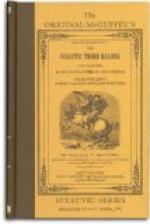15. And fast through the midnight dark and drear,
Through the whistling
sleet and snow,
Like a sheeted ghost, the
vessel swept
Tow’rds
the reef of Norman’s Woe.
16. And ever the fitful gusts between
A sound came from
the land:
It was the sound of the trampling
surf
On the rocks and
the hard sea sand.
17. The breakers were right beneath her bows,
She drifted a
dreary wreck,
And a whooping billow swept
the crew
Like icicles from
her deck.
18. She struck where the white and fleecy waves
Looked soft as
carded wool,
But the cruel rocks, they
gored her side
Like the horns
of an angry bull.
19. Her rattling shrouds, all sheathed in ice,
With the masts,
went by the board;
Like a vessel of glass, she
stove and sank,
Ho! ho! the breakers
roared!
20. At day break, on the bleak seabeach,
A fisherman stood
aghast,
To see the form of a maiden
fair
Lashed close to
a drifting mast.
21. The salt sea was frozen on her breast,
The salt tears
in her eyes;
And he saw her hair, like
the brown seaweed,
On the billows
fall and rise.
22. Such was the wreck of the Hesperus
In the midnight
and the snow:
Heav’n save us all from
a death like this
On the reef of
Norman’s Woe!
Definitions.—l. Skip’per, the master of a small merchant ves-sel. 3. Veer’ing, changing. Flaw, a sudden gust of wind. 4. Port, harbor. 6. Brine, the sea. 7. A-main’, with sudden force. 8. Weath’er, to endure, to resist. 9. Spar, a long beam. 13. Helm, the instrument by which a ship is steered. 18. Card’ed, cleaned by combing. 19. Shrouds, sets of ropes reaching from the mastheads to the sides of a vessel to support the masts. Stove, broke in.
Notes.—This piece is written in the style of the old English ballads. The syllables marked (’) have a peculiar accent not usually allowed.
4. The Spanish Main was the name formerly applied to the northern coast of South America from the Mosquito Territory to the Leeward Islands.
15. The reef of Norman’s Woe. A dangerous ledge of rocks on the Massachusetts coast, near Gloucester harbor.
19. Went by the board. A sailor’s expression, meaning “fell over the side of the vessel.”
LXX. ANECDOTES OF BIRDS. (193)
1. I had once a favorite black hen, “a great beauty,” as she was called by everyone, and so I thought her; her feathers were so jetty, and her topping so white and full! She knew my voice as well as any dog, and used to run cackling and bustling to my hand to receive the fragments that I never failed to collect from the breakfast table for “Yarico,” as she was called.
2. Yarico, by the time she was a year old, hatched a respectable family of chickens; little, cowering, timid things at first, but, in due time, they became fine chubby ones; and old Norah said, “If I could only keep Yarico out of the copse, it would do; but the copse is full of weasels and of foxes.




